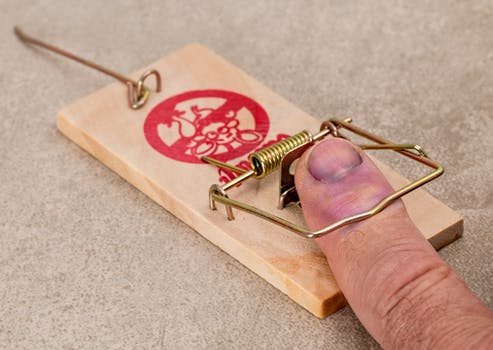 Join us Friday and Saturday, July 29-30 at City Square Park in downtown Chaska for River City Days. Every year we have a booth where we hand out FREE balloon animals and connect with the community. Last year we went through 1,300 balloons and connected with some great people. It is a lot of fun to see the faces of the kids who love our balloons. Each year we hear from parents who tell us that their kids remember us from the year before. If you are in the area, come on by and say, “Hi!”
Join us Friday and Saturday, July 29-30 at City Square Park in downtown Chaska for River City Days. Every year we have a booth where we hand out FREE balloon animals and connect with the community. Last year we went through 1,300 balloons and connected with some great people. It is a lot of fun to see the faces of the kids who love our balloons. Each year we hear from parents who tell us that their kids remember us from the year before. If you are in the area, come on by and say, “Hi!”
Christ our Savior
 For the last forty years the Heimlich maneuver has been synonymous with the abdominal thrust procedure for saving someone from choking. This method is named after a surgeon from Cincinnati named Dr. Henry Heimlich who apparently published this idea in an essay in the Emergency Medicine journal in June, 1974. Over the years this maneuver has been used to save the lives of many people who were choking.
For the last forty years the Heimlich maneuver has been synonymous with the abdominal thrust procedure for saving someone from choking. This method is named after a surgeon from Cincinnati named Dr. Henry Heimlich who apparently published this idea in an essay in the Emergency Medicine journal in June, 1974. Over the years this maneuver has been used to save the lives of many people who were choking.
But did you know that Dr. Heimlich never actually used the maneuver to save someone from choking until just a few weeks ago at the age of 96? He was apparently having dinner at his retirement home when a woman nearby began chocking and for the first time he used the Heimlich maneuver to save the life of this 87 year old woman.
What does it mean to save someone? It basically means to rescue someone from harm. In Titus 3:3-7, we read: “3 For we ourselves were once foolish, disobedient, led astray, slaves to various passions and pleasures, passing our days in malice and envy, hated by others and hating one another. 4 But when the goodness and loving kindness of God our Savior appeared, 5 he saved us, not because of works done by us in righteousness, but according to his own mercy, by the washing of regeneration and renewal of the Holy Spirit, 6 whom he poured out on us richly through Jesus Christ our Savior, 7 so that being justified by his grace we might become heirs according to the hope of eternal life.” (Titus 3:3-7, ESV)
Notice that Paul begins with the words we were. He doesn’t say they are, but we were. We were foolish, we were disobedient and so on. He is describing himself and Titus, and all followers of Christ, before we became followers of Christ. This helps us identify ourselves with those around us who do not know Christ and reminds us of who we are without grace.
And then we see one of the most wonderful words in all of Scripture. The word “but.” That word carries with it a whole lot of implication. Paul says this is who we were, but then Christ came into the picture. And he connects the word “but” with the goodness and loving kindness of God. He points out all of the stuff about who we used to be and then the word “but” is there because God loves mankind so much and he is so good that he worked redemptively for us by sending Jesus.
Then Paul points out that we are saved not by what we do, but by what has been done for us. We could never earn salvation. We could never have been good enough on our own. Actually without Christ we were enemies of God, going our own way, as if he didn’t even exist. But God saved us, because of his mercy.
God rescued us from sin, from guilt, from death, from hell, but he also saved us from being separated from him. We were created to live in fellowship with God. Sin messed that up, but through Christ God restored the opportunity for that relationship to be restored.
Paul points out that we are saved through the washing of regeneration and renewal of the Holy Spirit. That’s kind of confusing, so lets break it down. We were unclean because of our sin, and that separated us from God, so we needed to be washed. But that washing is combined with regeneration and renewal. The word regeneration basically means rebirth. It implies something that was old being reborn. Renewal refers to being made new. The Holy spirit washes our sins away and gives us new life in Christ.
This is not something we could ever have done in our own lives. We cannot wash ourselves from sin. We cannot give birth to a new nature in us. We need to have this done for us. And that is what the Holy Spirit does.
It is also beautiful to see that phrase poured out on us richly. That gives us the image of a generous God who is lavishing us with his love, kindness, and mercy. He is not being stingy. He is not holding back. He is not treating us as our sins deserve or giving us just a little bit of grace, he pours out this amazing grace on our lives.
And then in verse 7 Paul brings in the word justified. This is a legal term that basically means to be declared righteous. It is as if we are standing in a courtroom awaiting a guilty verdict that we deserve and the judge declares us not guilty. One of the things that happens in our lives through the work of Christ is that his sacrifice covers our sins, so that when God looks at us, rather than seeing our sin, he sees Christ’s righteousness and we are declared justified in his sight. We also become heirs who are welcomed in to the family of God and are given the inheritance of eternity with him in Heaven.
So when we talk about Christ our Savior, this is what we are referring to. Jesus died on the cross in order for us to be saved. And make no doubt about it, we needed rescuing. We could not save ourselves. Christ is our Savior.
Let me illustrate it this way…
 Way back in the beginning with Adam and Eve, God created things good and perfect. We even get the sense from the book of Genesis that God walked with man in the Garden. God created man to live forever in fellowship with him.
Way back in the beginning with Adam and Eve, God created things good and perfect. We even get the sense from the book of Genesis that God walked with man in the Garden. God created man to live forever in fellowship with him.
But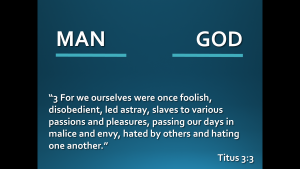 sin entered the picture and broke that fellowship. Sin wrecked the perfect good reality that God had
sin entered the picture and broke that fellowship. Sin wrecked the perfect good reality that God had
created. And man was separated from God. Like verse 3 said, we were going our own way, astray from God, slaves to sin separated from God. And as we know from Romans 6:23, the wages of sin is death. We were faced with an eternity of separation from God.
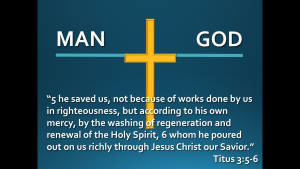 But god loved us so much that he sent us a Savior. Jesus died on the cross, so that our sins could be washed away, we could be declared righteous, and we could be made new, brought back to a right relationship with God and given the hope of eternal life.
But god loved us so much that he sent us a Savior. Jesus died on the cross, so that our sins could be washed away, we could be declared righteous, and we could be made new, brought back to a right relationship with God and given the hope of eternal life.
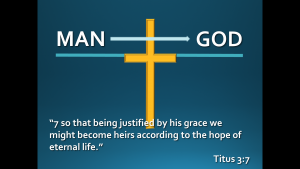 So how do we receive this gift? How do we respond to this message? In Romans 10:9,10 we read, “if you confess with your mouth that Jesus is Lord and believe in your heart that God raised him from the dead, you will be saved. 10 For with the heart one believes and is justified, and with the mouth one confesses and is saved.” (Romans 10:9,10, ESV)
So how do we receive this gift? How do we respond to this message? In Romans 10:9,10 we read, “if you confess with your mouth that Jesus is Lord and believe in your heart that God raised him from the dead, you will be saved. 10 For with the heart one believes and is justified, and with the mouth one confesses and is saved.” (Romans 10:9,10, ESV)
That is our response. We need to admit that we believe that Christ came to save us and that we want him to be our Savior. That’s it. If you are reading this post and have some questions or if you have responded to this Gospel message and would like to talk with someone about it, please email me at office@riveralliance.com
Traps and Snares
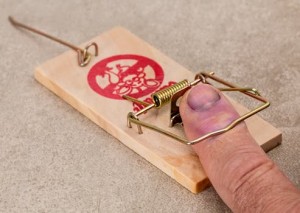 One of my best friends in college was a kid named Eric. He was a country boy from the farmlands around Lancaster, PA. We were very different. He grew up hunting and fishing, hanging out in the woods and living on a chicken farm and I grew up playing games at the video arcade and hanging out at the mall.
One of my best friends in college was a kid named Eric. He was a country boy from the farmlands around Lancaster, PA. We were very different. He grew up hunting and fishing, hanging out in the woods and living on a chicken farm and I grew up playing games at the video arcade and hanging out at the mall.
At one point Eric had to take a speech class and one of the assignments was to give a persuasive speech. Eric came up with the bright idea to do a speech on trapping animals. He wanted to talk about how using traps to catch animals was actually a very humane way of capturing them.
He decided that the best way to do that was to bring a trap to class and during his speech he would set it off on his own hand to show that it was not that bad. Unfortunately he did not practice that part and so he found out in the middle of the speech that it hurt a lot worse than he thought it would.
No doubt there are some traps that are much more humane than that trap that Eric used in speech class. But no matter how non-lethal a trap is, the purpose is still the same. The purpose of a trap is to lure and ensnare an unsuspecting victim.
In Luke 17:1-4 Jesus talks about traps. He is not talking about the physical ones like Eric was referring to in his speech, but about spiritual traps and snares in the form of temptation and false teaching.
In verse 1 Jesus tells his disciples that temptations to sin are sure to come. That means that we should expect temptation to be a normal and regular part of our lives. The original Greek version of the phrase “temptations to sin” in this passage actually uses the word skandala which means something along the lines of a snare or a trap. It is translated as stumbling blocks in the New American Standard Bible. In other words it is referring to the things that trip us up and cause us to fall.
That is an accurate word picture for us. Think about it like a snare laid out on the ground in our path that is specifically there with the purpose of tripping us up. Because of our sin nature we see those traps as desirable, or harmless, but the concept of a trap or a snare is that it’s very purpose is to cause us to fall. We need to recognize temptation for what it is.
We also need to realize that Satan wants us to trip and fall and that he is actively trying to destroy our relationship with God. We need to be aware of his schemes and the traps and snares that he intentionally puts in our way.
When those temptations arise we have the opportunity to choose to follow what we know to be God’s will for us or we can embrace the temptation and move into sin. The more we choose to follow God’s will and turn away from sin, the more we are going to get to know God’s will and be able to recognize those stumbling blocks and snares for what they are. Unfortunately the opposite is also true. The more we choose to ignore God’s will and choose to give our bodies over to sin, the less we are going to be able to understand God’s will and the more likely we are going to be fall into those tempting traps.
While we are saved by grace and not by our ability to stay away from bad things, choosing to ignore God’s will and give ourselves to sin, leads us down a path away from God. Sin is a harsh slave master. Temptation looks all nice and pretty and desirable, but it is a snare and it leads to slavery.
Jesus goes on in verse 1 to specifically challenge us to not be the ones leading people into those snares. When I was younger I watched movies that contained nudity. Over the years I started specifically staying away from those kind of movies because I know that is a temptation that I should avoid. However, when I was younger, not only did I watch those movies, I also watched them with friends or with my younger brother. That means that I was not just exposing myself to temptation, I was exposing them to it as well. And in this verse Jesus is saying woe to those who would do that.
In verse 2 he goes on to point out that it would be better to have a millstone hung around his neck than to cause a little one to sin. A millstone was a heavy, flat stone that was used to crush grain. Imagine for a moment the terrible death these words are illustrating. And yet Jesus is saying that it would be better for that to happen than to cause one of these little ones to stumble.
I look back at my life with a lot of regrets for what I was like in high school, college, and early adult life. It was not that I was terrible, but I probably had more bad influence on people than I had good influence and I didn’t even realize it. I probably had heard this verse, but I never really connected the dots to myself.
We need to recognize the role we play in the temptation of others. In verses 3 and 4 Jesus goes on to point out that it is not even enough for us to just not have a negative influence on others, we have to take it a step further. Jesus challenges us to confront our brothers when they sin. This means that if we see one another sinning we are not supposed to ignore it, we are to confront one another. We don’t do this to condemn them, but to lead them to repentance. And if they repent we are to forgive them, even if we have been wronged in the process.
These verses are a powerful reminder of the important role we play in one another’s lives. Imagine us all walking on a path together like some kind of giant nature hike. As we walk, we need to recognize that there are traps and snares all over the place that would trip us up and cause us to fall. We need to be watching out for them, not just for us, but for one another as well. We need to point out the traps as we walk and we need to be especially making sure that we are not the ones leading people into those traps. Then, if one of our brothers falls into a trap, we should be there alongside them to help them out and to help them get back on their feet. It is like we are walking this path together, and we care for one another along the way, helping each other on this journey of following the Lord.
Rahab’s Example
 Rahab was a prostitute in the city of Jericho when the people of Israel showed up with the command from God to go in and take the promised land. The Israelites sent in spies to check things out and they wound up at the home of Rahab in Jericho and she went out of her way to hide and protect them when they were in danger. Even though she was not an Israelite she believed in the stories she had heard of their God and chose to align herself with him rather than with her own people. And she and her family were spared when God destroyed the city. You can read more about the story of Rahab in Joshua 2.
Rahab was a prostitute in the city of Jericho when the people of Israel showed up with the command from God to go in and take the promised land. The Israelites sent in spies to check things out and they wound up at the home of Rahab in Jericho and she went out of her way to hide and protect them when they were in danger. Even though she was not an Israelite she believed in the stories she had heard of their God and chose to align herself with him rather than with her own people. And she and her family were spared when God destroyed the city. You can read more about the story of Rahab in Joshua 2.
Later on Rahab is mentioned in Matthew 1:5 as part of the genealogy of Jesus. She was David’s great, great grandmother. She is also mentioned in Hebrews 11 as part of the faith hall of fame. And she is given as an example of faith showing itself in works in James 2.
In that passage James poses a very interesting question in verse 14: 14 What good is it, my brothers, if someone says he has faith but does not have works? Can that faith save him?
This is a strong challenge. He is questioning people’s salvation. But notice that James is not comparing those who have faith to those who have works. That is not really the point. He is comparing those who say they have faith, but it doesn’t show in the way they live their life, compared to those who are visibly demonstrating their faith by how they live.
He gives an example in verses 15 and 16: 15 If a brother or sister is poorly clothed and lacking in daily food, 16 and one of you says to them, “Go in peace, be warmed and filled,” without giving them the things needed for the body, what good is that?
In this specific example James is not talking about a stranger, but about a brother or sister in Christ. He is talking about someone within the body of Christ who is in obvious need. This implies that the person who says they have faith knows the person in need, knows their need, and rather than helping them out, simply says “go in peace, be warm and well fed.” This almost seems sarcastic, because the words they say are in direct correlation to the specific needs of the person. But rather than help them, they just say some words. This is the exact issue that James has with their so-called faith. It is nothing more than words.
James calls that kind of faith dead in verse 17: 17 So also faith by itself, if it does not have works, is dead.
James is calling for our faith to be alive. Our faith should be evident in our lives. People should be able to see Christ in us. Our testimony cannot just be a testimony of words, it needs to be a testimony of life.
In verses 20-23 James points to the example of Abraham and how his faith showed up in what he did and then he shares a controversial statement in verse 24: 24 You see that a person is justified by works and not by faith alone.
In this verse it seems like James is kind of contradicting the belief that we are saved by grace through faith, rather than works. But we need to understand verse 24 in light of the rest of what James is saying. He is not comparing faith to works, he is not even saying it is faith plus works, he is saying that true faith is shown in works. If we really have faith, then it should be evident in our lives.
And then James points to the example of Rahab and ends with a strong challenge in verses 25 and 26: 25 And in the same way was not also Rahab the prostitute justified by works when she received the messengers and sent them out by another way? 26 For as the body apart from the spirit is dead, so also faith apart from works is dead.
So like the example of Abraham, Rahab is commended here for her actions or works. That does not mean that she was saved by her works, but rather that her works were a response of faith. The work that James is referring to is that she harbored the spies and hid them and went out of her way to help them. Why do you think she did that?
In Joshua 2:8 – 13 Rahab actually answers that question for us. She tells the spies about how word of the Lord had spread and fear of him had fallen on the land and then she testifies to what she believes at the end of verse 11: for the Lord your God, he is God in the heavens above and on the earth beneath.
The reason she helped the spies is because she believed in their God. She believed that he was who he said he was and that he would do what he said he would do. That is faith. She had faith and so she did what she did. Her works were her response of faith.
I believe the example of Rahab is very poignant. Notice that James refers to her not just as Rahab, but as Rahab the prostitute or Rahab the harlot. Her life was so defined by prostitution that that is how she is known. And yet James refers to her being justified by her works. He is not talking about her work as a prostitute, but by what she did when she took care of the spies. So even though she is known as Rahab the prostitute, with that stigma attached to her for her whole life, she is described here and in the book of Hebrews as a woman of faith. She could have let her past define her and continued along that path, but she stepped out in faith and followed God.
I think that is a powerful reminder to us. We may often look back at our lives with feelings of failure and discouragement. We may even feel defined by things that are not flattering. But while we can’t change the past, we don’t have to let it define how we are going to move forward. I am not calling on us to focus on the work we haven’t done, or the things we have messed up or done wrong. I am calling us forward from this point on, that our faith would be alive and that we would step out in faith and follow God.
Good, Good Father
 In Matthew 7:7-8 we read: “Ask, and it will be given to you; seek, and you will find; knock, and it will be opened to you. 8 For everyone who asks receives, and the one who seeks finds, and to the one who knocks it will be opened.
In Matthew 7:7-8 we read: “Ask, and it will be given to you; seek, and you will find; knock, and it will be opened to you. 8 For everyone who asks receives, and the one who seeks finds, and to the one who knocks it will be opened.
So in this passage Jesus is speaking on prayer. Asking, seeking, and knocking are all basically forms of prayer. They are speaking of us going to God with requests.
I don’t believe this passage is saying that we can ask for whatever we want, regardless of God’s will and we will get it just because we ask. I don’t believe that is what it means to be a good father. I don’t give my kids everything they ask for and it is not because I am being mean, it’s because I love them and I am trying to do what is best for them.
Sometimes we go to God with things that seem good and we can’t see any reason why it would not be good for us to receive what we are asking for. And yet still God does not give us what we want. Those times are tough.
I have a good friend who is a pastor and his wife has cancer. I don’t know why God has not just stepped in and miraculously healed her. There is no reason that I can see for that not to happen. I can only imagine what it must be like to cry out to God again and again and not receive that healing.
Sometimes when we cry out to God again and again, and don’t receive what we are asking for, our souls hurt and we can begin to forget who God really is and who we are in him.
This passage is teaching us something very important about God. Overall this passage is about prayer, but Jesus is also pointing out that God is a good father. Look at the example Jesus gives in verse 9-11: 9 Or which one of you, if his son asks him for bread, will give him a stone? 10 Or if he asks for a fish, will give him a serpent? 11 If you then, who are evil, know how to give good gifts to your children, how much more will your Father who is in heaven give good things to those who ask him!
A good earthly father may not always give his son what he asked for, but he is not going to ignore him or taunt him or give him something harmful instead. And Jesus says that if that is true of an early father how much more true is it of God.
This is known as an “a fortiori argument” or an argument from the lesser to the greater. If a good early father would respond like this, then think about how much more we can expect from God. God is better than even the best image we could have of what a good earthly father is like.
I think I am a decent father and I believe that my children know that I love them and want the best for them. But I know I am far from perfect. I have had to apologize to my children many times for losing my cool, or accusing them of things they didn’t do or lack of patience or other things. I am far from perfect.
But I know how much I love my children. They mean more to me than I could possibly express. Recently I was singing the song “Good, Good Father,” by Chris Tomlin. As I was singing I was drawn into the image of how I see my kids. I was trying to put myself in their shoes and if only they could see themselves through the way I see myself looking at them. If they could only recognize how much I love them, not because of how good they are at pleasing me, but simply because they are my children. And then I was thinking, do I see God that way? Do I really see him loving me with the kind of love that I have for my kids, only infinitely greater?
I sometimes get a very warped idea of who I am in God’s sight. I can be very performance based in my thinking like I have to please God or always be on my best behavior rather than just recognizing that he is my dad and I am loved by him. And his love for me is not based on how well I am doing, but because I am his child.
So as I was singing this song I felt like I was crying out for my soul to get this. I want to know, down deep in my soul, that God is a good Father and I am loved by him. That doesn’t change. It is who he is and it is who I am in him.
This passage is about prayer, but it is also a reminder that God is a good father. A few chapters earlier when Jesus was teaching his disciples to pray he used the word Abba, which is a very intimate expression of father. Imagine thinking of God like our daddy.
I may not know why God doesn’t answer some of our prayers the way we think he should and I don’t know why some of us are going through the things we are going through. But if I know that my Father God is a good father, and that he loves me and wants what is best for me, then I can rest in him and trust that he will take care of me.
Sometimes in our lives we forget that image of God. And in those times it is easy for us to give up and lose hope. But when times are bad, that doesn’t mean that God is not a good father or that we are not loved.
In this passage where Jesus uses the words ask, seek and knock, those verbs are all in the present tense. They could be looked at more along the lines of keep on asking, keep on seeking and keep on knocking. I understand what it is like to be tired of asking, seeking and knocking. But I want to remind us today that our God is a good father. Let’s hold on to that image of him, even if we need to cry out to our own soul to remember that. And let’s continue to bring our prayers before him, trusting that he hears us, that he knows what is going on in our lives, and that he loves us very much.
Resurrection not just Reanimation
 So Zombies are kind of a big deal lately. There are many TV shows and movies related to zombies. There was even a youtube video that went viral recently about a couple of brothers who pranked their younger sister on the way home from having wisdom teeth surgery. They got her to believe that a zombie apocalypse was beginning. Last I saw it had almost 14million hits. According to Wikipedia “A zombie is a fictional undead being created through the reanimation of a human corpse.”
So Zombies are kind of a big deal lately. There are many TV shows and movies related to zombies. There was even a youtube video that went viral recently about a couple of brothers who pranked their younger sister on the way home from having wisdom teeth surgery. They got her to believe that a zombie apocalypse was beginning. Last I saw it had almost 14million hits. According to Wikipedia “A zombie is a fictional undead being created through the reanimation of a human corpse.”
Today zombies are potentially more popular than they have ever been. If you go online you will find all kinds of information on zombies, including many sites that focus on the best way to survive a zombie apocalypse. I even came across articles on this subject on the websites for The Center for Disease Control, US News and World Report, and The Washington Post.
Recently I was asked by someone in my church, “What does the Church mean by bodily resurrection?” This person referred to the apostle’s creed which refers to the resurrection of the body and the life everlasting. They were wondering if this means that when we go to Heaven we will have a body like we have now? In other words, will we be resurrected back into the body we had before we died? And if so, then at what stage? Does a person just end up with the body they had right before they died, or is it from like when they were in their prime? And what about someone who was missing a limb or had some major problem with their body, is that fixed? And what if you were cremated? Does that mean you can’t be resurrected? The person who was asking these questions didn’t specifically connect this to zombies, but they are trying to figure out what to make of the idea of bodily resurrection.
Well, first of all let me point out that we are not talking about reanimation we are talking about resurrection. That is a significant difference. Scripture may not give us a definitive picture of what these resurrected bodies will look like, but in I Corinthians 15 Paul gives us enough of an image to recognize we are talking about something a whole lot better than zombies.
Paul begins that chapter with a very succinct outline of the Gospel. In a few verses he reminds us that Christ died for the sins of the world, that he was buried and that he rose again and appeared to many people. It is kind of like the Gospel in Cliff Notes fashion.
These first six verses provide an important foundation and then Paul moves on to connect Christ’s resurrection with our own. It is important for us to realize that Jesus did not just die as a sacrifice for our sins, he rose again in victory over death and sin and paved the way for our resurrection.
There were apparently some in Corinth who were suggesting that there was no resurrection for the dead. In these verses Paul lays out a very logical argument that reminds them of the completeness of the Gospel.
Paul then moves on to talk a little bit about what this will be like. Paul doesn’t give us an exact picture of what to expect, but he gives us a few images to think about to help us consider the idea of a resurrection body.
The first analogy is of a seed in verses 36-37. A seed that is planted in good soil germinates. Basically the seed itself disintegrates or dies, but out of that seed grows new life in the form of a plant. And what comes up out of the ground is not the same thing that went into the ground, but something new and different.
So we can understand the analogy to the seed. A person dies, they are even planted in the ground, and a new body comes up out of the ground at the time of resurrection. We should not expect it to be the same as it was when it went into the ground, but rather something new.
Paul moves on to the analogy of different kinds of animals in verse 39. We know and understand the difference between a human being, an animal, a bird and a fish. Their bodies are designed for very different purposes that are right for the environment where they will exist. Our resurrection bodies will be different than our earthly bodies and will fit the needs of the new environment awaiting us.
And then Paul moves on to compare earthly and heavenly bodies in verses 40-41. Right now we live in earthly bodies. They are fine and work for here on earth, but God has something different in store for us in Heaven. These bodies were not meant for Heaven.
Paul then goes on to make some comparisons in verses 42-44. First he talks about how our bodies will be imperishable compared to perishable. That means that our resurrected bodies are not going to fade away or be temporary. It is a body that will be built to last.
He then talks about how when we die, that is the low point for our earthly bodies. They finally run out of strength and fail completely. And when they do our bodies are at their weakest and most dishonorable. But out of that weakness and dishonor of death our new bodies will rise in glory and power. I don’t know exactly what that looks like, but it sounds pretty good.
The last comparison Paul points out is that our resurrected bodies will not be natural, they will be spiritual. This is an important distinction. I don’t know exactly what that will mean, but I would image that a lot of the limitations we know now, will not be limitations then.
Then in verses 45-49 Paul talks about how we will be born in the image of the man of heaven. We started life with earthly bodies. Adam was made out of the dust of this earth and so were we. Our earthly bodies reflected Adam. But our new bodies will be more reflective of Christ and that doesn’t mean we will look like he looked while he was on this earth, but more in the image of who he is in Heaven. We will all finally have heavenly bodies.
Then Paul ends the chapter by telling us of the victory that is coming. For those of us who believe in Christ, death is not the end. Death is a result of the fall. It Is because of sin. In Christ we are set free from that curse of sin and have victory over death. For most of the world death is seen as the biggest defeat of our lives. But Paul is turning things upside down and saying that it is not defeat. Death has been defeated and victory is ours in Christ as we are raised to new life with imperishable, glorious new spiritual bodies.
We may not be able to picture exactly what that means or looks like, but the specifics don’t matter. Paul gives us enough information here to recognize that we have a lot to celebrate.
Paul’s final verse ends with a good note of encouragement for us in light of the resurrection. He writes: Therefore, my beloved brothers, be steadfast, immovable, always abounding in the work of the Lord, knowing that in the Lord your labor is not in vain.
There is a confidence in this resurrection that allows us to get on with our daily lives. We can be steadfast, immovable, abounding in the work of the Lord, because we know that our future is secure. In Christ, we know that one day we will rise again to spend eternity with him, and that understanding of our future allows us to have confidence here and now for whatever we are facing today.
We are looking forward to a glorious life in Heaven and while we are here on this earth we can stand in that victory even though we have yet to experience it. I know life is not always easy here on this earth, but understanding this chapter can give us strength to stand immovable, knowing what is to come.
Footwashing
 In John 13 we find a well-known story about Jesus washing his disciple’s feet. In Jesus’ times people walked around all the time in sandals or barefoot and picked up a lot of dirt and other grime along the way. Footwashing was essential, but it was a menial task that someone usually did themselves or had a servant do for them. Yet in this story we see Jesus washing his disciple’s feet.
In John 13 we find a well-known story about Jesus washing his disciple’s feet. In Jesus’ times people walked around all the time in sandals or barefoot and picked up a lot of dirt and other grime along the way. Footwashing was essential, but it was a menial task that someone usually did themselves or had a servant do for them. Yet in this story we see Jesus washing his disciple’s feet.
In verse 8 Peter objects saying, “You shall never wash my feet.” Why was Peter so appalled by the idea of Jesus washing his feet? Because it was a task reserved for servants or slaves. Jesus was their teacher, their master and their Lord. And yet he put himself in a subservient position, stripped down to his skivvies, grabbed a bowl of water and a towel and went around on hands and knees washing their feet.
Should somebody else have washed the feet? Maybe. It was customary at the time for the host to have a servant wash the feet of those who were guests. That doesn’t happen here. No host or servant is even mentioned in the room at the time. But it does seem that there was a pitcher and a bowl and a towel readily available. Any one of the disciples could have offered to wash the feet of the others. But I would imagine they all that task was beneath them. Knowing the disciples they were probably looking around at each other figuring that one of the other guys should do it. They did after all get caught on multiple occasions arguing about which one of them was the greatest.
In reality, one of the disciples should have done this footwashing. If there was one person in the room who should not have done it, based on the customs of that time, it was Jesus. And yet he is the one who did it.
This would have been an emotional, powerful, jarring image for the disciples. And that is probably what Jesus was going for, because the lesson is not just about serving one another. This is a lesson in humility. Jesus is saying, if I would wash your feet, then whose feet could it possibly be beneath you to wash?
Jesus then goes on to challenge them to follow his example in verse 17, “If you know these things, blessed are you if you do them.”
Jesus wants us to serve one another, but I think we can serve others without really getting the lesson that Jesus is giving here. We can approach this almost like a boy scout approaching getting a service merit badge, but I don’t think that is the point.
I believe Jesus is challenging them to a brand new way of viewing their lives. I believe he is calling them to a radical self-abasing, others-focused kind of life. It is the kind of life that Jesus himself exemplified in the way he lived and died. He didn’t just sacrifice his life on the cross, he sacrificed it every day he lived on this earth by the way he cared for and served those around him.
I don’t think that Jesus is calling us to acts of service. I think he is calling us to heart change. He is calling us to a heart of humility and servanthood and that is harder than just volunteering for some service projects.
This is a lesson or us to have different view of our lives. It is for us to humble ourselves to look at our lives with a different perspective recognizing that we are servants of Christ and therefore servants of one another. Remember, as followers of Christ, we are to be becoming like the one we are following. Well, this passage is who Christ is. He lived a life of humility and servanthood. And I believe the only way for us to become like this is for him to work supernaturally in our lives to make us more like him. The question is, do we want this and are we willing to yield our lives to someone who wants this for us?
Guilty Pleasures
 There are many things that I love that I am somewhat embarrassed to share with people. For instance, I love Totino’s froze pizza. It is one of my guilty pleasures. I enjoy it, but I don’t tell everyone. I want them to believe that I have a more refined palate. Sometimes I do. But I also still love a good Totino’s frozen pizza from time to time.
There are many things that I love that I am somewhat embarrassed to share with people. For instance, I love Totino’s froze pizza. It is one of my guilty pleasures. I enjoy it, but I don’t tell everyone. I want them to believe that I have a more refined palate. Sometimes I do. But I also still love a good Totino’s frozen pizza from time to time.
I am willing to confess that to you in this blog, because it is funny and quirky and interesting. But how willing would I be to confess more than that? how willing would I be to go deeper and share some of the deep, dark things that I don’t want anyone to know about my life?
James 5 contains an excellent passage on healing ministry within the church, but sometimes we pay so much attention to what James is saying in verses 13-15 on healing, that we miss out on what he says in verse 16: “Therefore, confess your sins to one another and pray for one another, that you may be healed. The prayer of a righteous person has great power as it is working.” (James 5:16, ESV)
James says to confess our sins to one another. That idea seems somewhat foreign to us. We are okay sharing things like our silly love for Totino’s pizza, but we don’t really want to go any farther than that. We don’t want to be that vulnerable. We don’t want to let others know the stuff we struggle with. We don’t want to air our dirty laundry. We are more comfortable letting others think that we have our act together.
But James is telling us to not hold that stuff in. We are to confess to one another. There are many benefits to this type of confession. It allows us to welcome and invite accountability into our lives. It allows us to publicly recognize our struggles. It brings dark things out of the shadows and into the light. It invites others to get involved in our brokenness and to pray for us and help us in our spiritual journey.
Also, it is interesting to note that verse 16 is part of this passage on healing. Sometimes when we have unconfessed sin in our lives, it can eat us up from the inside out. We can literally be stressing about our unconfessed sin to the point where it is causing physical problems and sometimes we don’t even realize what is going on.
It is also a benefit for the church as a whole. I believe the church over the years has done a disservice in that we have hidden sin, and pretended that we all have our act together. Confessing to one another breeds intimacy, and helps others be open to sharing what is going on in their lives. It allows those who struggle with similar things to recognize that they are not alone. It allows us to reach a new level of authentic community.
In order for this kind of confession to happen, we must not be judgmental and we need to be trustworthy. We have to be a safe place where people can be vulnerable without worrying that it will be used against them in some way.
James then goes on to challenge us to pray for one another. It is a natural progression for us to go from sharing with one another about our sins, our struggles, our failures, and our needs and then to simply pray for one another. And that also is good for both the individual and for the church as a whole.
But for this too we must be vulnerable. We have to stop asking for prayer for our neighbor or our great aunt, and start asking for prayer for ourselves. We need to let other people know of our struggles, our failures, our hurts and our pain. And then we can really pray for one another.
It doesn’t seem natural for us to be that vulnerable with one another. We are more comfortable sharing about the things that don’t really matter. But if we are going to become the church that God is calling us to be, then we need to put aside those barriers that get in the way and confess our sins to one another and pray for one another.
Ultra-Marathon Life
 A few weeks ago at Crown College I had the opportunity to meet Malcolm Mcloughlin. He is an Irish author who was at Crown to speak for their Missions Fest. He shared about running ultra-marathons of 40, 50 and even 100 mile races and compared that to the endurance of a lifelong journey with Christ.
A few weeks ago at Crown College I had the opportunity to meet Malcolm Mcloughlin. He is an Irish author who was at Crown to speak for their Missions Fest. He shared about running ultra-marathons of 40, 50 and even 100 mile races and compared that to the endurance of a lifelong journey with Christ.
Hebrews 10:19-39 is a powerful passage about recognizing who we are in Christ, drawing near to God and having endurance in the faith. This call to endurance reminded me of what Malcolm Mcloughlin was talking about at Crown College. He referred to how someone could fake a 5k or a 10k race. You don’t have to be a runner to run those races. Malcolm also said that you could even train for a bit and fake a half marathon, or maybe even a marathon. But ultra-marathons are different. They take a different amount and level of training and endurance that you can’t fake. And then, he likened that to the Christian life.
This theme of endurance seems to be central to what the author is talking about. But what jumped out at me is that right in the middle of the passage there are a couple of verses that are focused on our relationships with each other. In verses 24 and 25 the author writes, “And let us consider how to stir up one another to love and good works, not neglecting to meet together, as is the habit of some, but encouraging one another, and all the more as you see the Day drawing near.” (Hebrews 10:24-25, ESV)
That word spur is actually a word whose meaning is more along the lines of irritation or exasperation, contention or argument. The overall wording would direct us toward the idea of provocation and it is used with one another to denote the idea of like mutually provoking one another.
It brings to mind that training buddy who pushes you to go on even when you think you can’t do anymore. The one who challenges you to do one more push up, or to do one more weightlifting rep, or to run one more mile. And in the midst of those times when we are being pushed to continue on, we may even become annoyed with that training buddy, but we know that we need them. If we are going to run this race, we need them in our lives.
In these verses the author says do not neglect meeting together as is the habit of some. We need to realize how important we are in one another’s lives. When we come together it is not just about singing a few worship songs and listening to a sermon. The times that we get together are opportunities for us to connect with one another and become a body, so that we can be in position to speak truth into one another’s lives and encourage each other, and correct one another’s theology and help each other stay strong in the midst of weaknesses and hold each other accountable, because enduring through a life long walk with Christ is hard.
If all we look at church as is a place to sing some worship songs and to hear a sermon, then church hopping, or occasional attendance, or staying on the periphery, or even just catching sermons online and listening to worship songs in our car can take the place of that kind of church.
But this passage is telling us that there is more to church than that. We need each other. We need the relationships within the church to help us endure. We need to recognize that we are running a marathon, not a sprint. And while it may seem easy today, there will be days ahead that will not be as easy. So let’s not give up meeting together, but rather let’s intentionally develop the kind of relationships with one another where we can encourage each other and spur one another on in this ultra-marathon of life.
Stop Lying
 In Colossians 3:1-17 Paul is talking about putting off our old lives and putting on our new life in Christ. He challenges us as followers of Christ to focus our lives on Christ rather than on the things of this world. That doesn’t mean that we don’t live in this world or we don’t partake of the things this world has to offer, but we are not to look at the things of this world in the same way anymore. Christ is to be paramount in our lives. If we are followers of Christ, our focus should be on following him.
In Colossians 3:1-17 Paul is talking about putting off our old lives and putting on our new life in Christ. He challenges us as followers of Christ to focus our lives on Christ rather than on the things of this world. That doesn’t mean that we don’t live in this world or we don’t partake of the things this world has to offer, but we are not to look at the things of this world in the same way anymore. Christ is to be paramount in our lives. If we are followers of Christ, our focus should be on following him.
And so in verses 5-11 he then begins to unpack that idea by talking about things that should no longer define our lives. Since we have been made alive in Christ, there are some things that were part of our old life that should no longer be part of this new life that we have in him. So he is challenging us to recognize those things and get rid of them.
Christianity is not just about receiving a list of things that we are not supposed to do anymore. Rather, I believe, God has a better life, a deeper life in store for us than whatever defined our old lives. However, that old life is still there for us to choose, so Paul is calling us to choose to turn away from that old life and to embrace what God wants for us.
With that in mind Paul moves on to talk about the new life and what it should look like in us in verses 12-17. This list has some similarities to the Fruit of the Spirit from his letter to the Galatians and overall it is pointing us in a direction of what new life in Christ should look like. Hopefully we are growing in these areas.
Overall Paul’s emphasis is on putting off our old self and putting on the new self in Christ, but he makes several significant points that specifically revolve around our relationships with one another. Right now that is where we are focusing as a church. We want to learn and grow in this area of our relationships with each other as a church.
For instance, look at what Paul writes in verse 9: 9 Do not lie to one another, seeing that you have put off the old self with its practices. (Colossians 3:9, ESV)
Now notice that Paul doesn’t just simply say stop lying, but specifically addresses the issue of lying to one another. Lying amongst ourselves is divisive and leads to distrust and disunity. We are called to be one body, and lying to one another directly attacks that unity and harmony within the body.
Considering the context, this could be referring to false teachers and lies they may be spreading. That is definitely a problem that needs to be dealt with. We need to treat God’s Word well and there is no room for false teaching.
However, what this verse really brings to mind for me is when we put on our church faces and go to church and tell everyone that everything is fine and that we have no problems. We lie to one another all the time to hide what is really going on inside, the sin and temptations we deal with, the struggles we face, the failures we’ve had, and the pain we feel.
We also sometimes lie to one another because we don’t want to hurt each other’s feelings. So when we see something in their life that we know is contrary to God’s will, we are afraid to hold them accountable on it.
We need to be real and authentic with one another. And that means being both brutally honest and completely vulnerable with one another. That is scary, but if we work hard to build those kind of relationships with one another where that would work, then imagine how good it would be for us. Imagine if this was the kind of place where we could stop lying and just be real with one another. That would be refreshing wouldn’t it?



